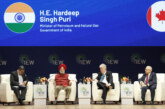Need for Civility
By Dr Arvind Kumar
Viewed in a broad spectrum, almost all human beings are equal and valuable, not because of what they think but because of who they are. Even when they are badly mistaken, their dignity requires respect for their freedom and conscience. According to Michael Gersom, a society becomes more just and civil as more people are converted to this moral belief in human dignity and reflect that conviction in their lives and laws. Undeniably, doubt is useful and needed at the margins of any ideology, but the world is too complex to know completely. While asserting that that many of our judgments are, by nature, provisional, Gersom opines that yet doubt becomes destructive as it reaches the center of a belief and becomes its substitute. A systematic skepticism may keep us from bothering our neighbor. It does not motivate a passion to fight for his or her dignity and rights. The dilemma still remains unresolved as to how do ambiguity and agnosticism result in dreams of justice, in altruism and honor, in sacrifices for the common good.
In Gersom’s opinion, moral conviction is not a synonym for arrogance and the path to civility calls for humility. A civility based on doubt demands an appreciation for one’s own ignorance. A civility grounded in human dignity requires us to bow before a principle greater than ourselves – the belief that others count and matter as much as ourselves. The latter is more difficult to cultivate, but more lasting and important. Mahatma Gandhi and King Martin Luther Jr. represent best examples of civility.




